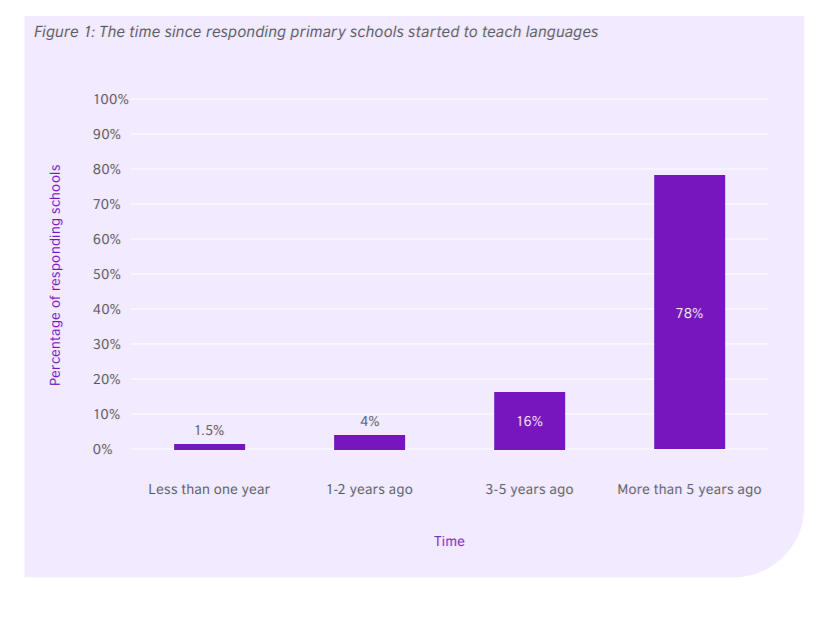
A French teacher has been offering classes for children to be able to learn French online and in local Salford schools.
Aurelie Detrez has been helping to engage children from a younger age of 0-11 years to help encourage language development whilst they are able to take in more information.
“So it’s all about teaching in a in a fun way and obviously educational. Children learn through games, so they don’t realise they’re actually learning. So, for the little ones we do loads of songs and stories, we use lots of props.
“For the older ones we just try to adopt our games. And yeah, they all really enjoy it. It’s all about having fun basically.”
Studies have found that the brain systems in control of language acquisition and learning have accelerated growth from six years old until puberty, meaning that engaging children earlier could benefit them in the long run when it comes to learning another language.

Aurelie explains how consuming different mediums early on can benefit children.
“You can start literally from birth, because then the brain gets used to different sounds. It’s just amazing, you can definitely teach from zero.
“I’ve got two children, they’re bilingual and by just listening to music in French, the radio in French, it reallyhelped them to understand as well that it’s not just English language in the world.”
Aurelie also explained how it’s not just the language aspect that will help develop their social skills:
“It’s not all about the language, it’s about the culture as well and I think it’s really important that children learn different languages to be open minded.

“I really tried to promote that because people think ‘oh, you know, I don’t need to learn French or Spanish or Japanese, it doesn’t matter’ as long as they speak English.”
62% of people surveyed can’t speak any other language apart from English. 38% of Britons speak at least one foreign language, 18% speak two and only 6% of the population speak three or more.
The European Union average showed that 56% speak at least one foreign language, 28% speak at least two and 11% speak three or more. Since 2014 the Primary National curriculum has made it compulsory to teach a foreign language.
However, statistics from the British Council’s Language Trends study show that respondents reported that in 53% of primary schools in England, language teaching was discontinued during the first national lockdown from 23 March 2020 to late June 2020.
During this time there was no online teaching and pupils were not provided with work for languages, which would seem to greatly diminish the reach these lessons have.
Aurelie detailed how the reaction has been since classes started in person after lockdown.
“The response has been absolutely amazing. I’ve got a waiting list. So, I think parents are really keen for them for the children to learn French in this case.
“Some parents said it is going to be useful because they would like to go on holiday to France, so they would like their children to know a few words.
“I think parents are quite keen and also, my classes online are really popular. I’m doing four a week and my infant class is fully booked. So yeah, I would say parents are quite keen which is good.”
A total of 62% of responding state secondary schools reported there was a ‘big negative impact’ on language teaching during the first national lockdown (23 March 2020 to late June 2020) and a further 26% of schools said there was a ‘small negative impact’.
Only eight percent of schools reported no impact.
Deprived areas of the country took the biggest hit when it came to learning, as 71% of primary schools said they suffered a ‘big negative impact’ by the lockdown.
Mrs. Detrez also explained why she feels students might not be keen to learn a language by the time they reach high school.
“There is a fear. You feel embarrassed because you don’t understand and when you’re 12 years old, you want to understand what’s going on and so you feel stressed.
“Probably some children feel incompetent as well because I think their brain is just not used to languages. So if they learn it a bit at school, even if they learn French and then they do Spanish in high school, it will help them be a bit less stressed about it.
“I think is a problem unfortunately, that in high school It’s not as fun because there’s quite a high expectation from the children, and unfortunately teachers can’t really do as many fun things that we can do in primary school.”

However there is still a push to learn them, 78% of responding schools report that they have been teaching languages at Key Stage 2 (Years 3-6, ages 8-11) for more than five years, which is an increase on the 75% reported in Language Trends 2019.
In response to a poll we posted on social media, one Salford parent responded:
“I’d prefer the LA to provide better provisions for children with additional needs rather than trying to teach him things he doesn’t have the capacity to learn.”
Another respondent said:
“Absolutely, as a linguist and language teacher I am fully biased, but children of that age are language sponges and that time is a great opportunity to start cultivating the capacity for learning languages! And in later life learning languages helps to broaden awareness and interests in other cultures, other places, and other opportunities in the world ![]() particularly important for me post-Brexit, as we risk cultural isolation and single-mindedness”
particularly important for me post-Brexit, as we risk cultural isolation and single-mindedness”
92% of people who responded to the poll said that they would want their child to learn a language at primary school.














Recent Comments